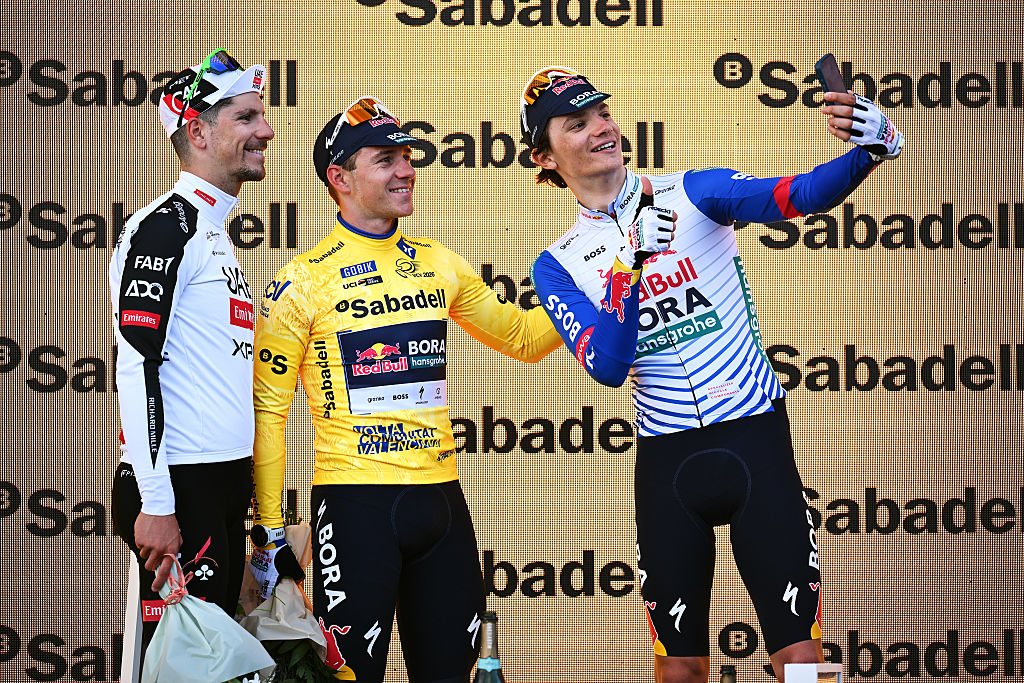Tadej Pogačar's final challenges: the Vuelta a España – a Grand Tour too far, or an easy box to tick?
Would a Vuelta a España bid be a walk in the park to Madrid for the all-conquering UAE leader, or could the race actually be much tougher than it looks on paper for him to win?
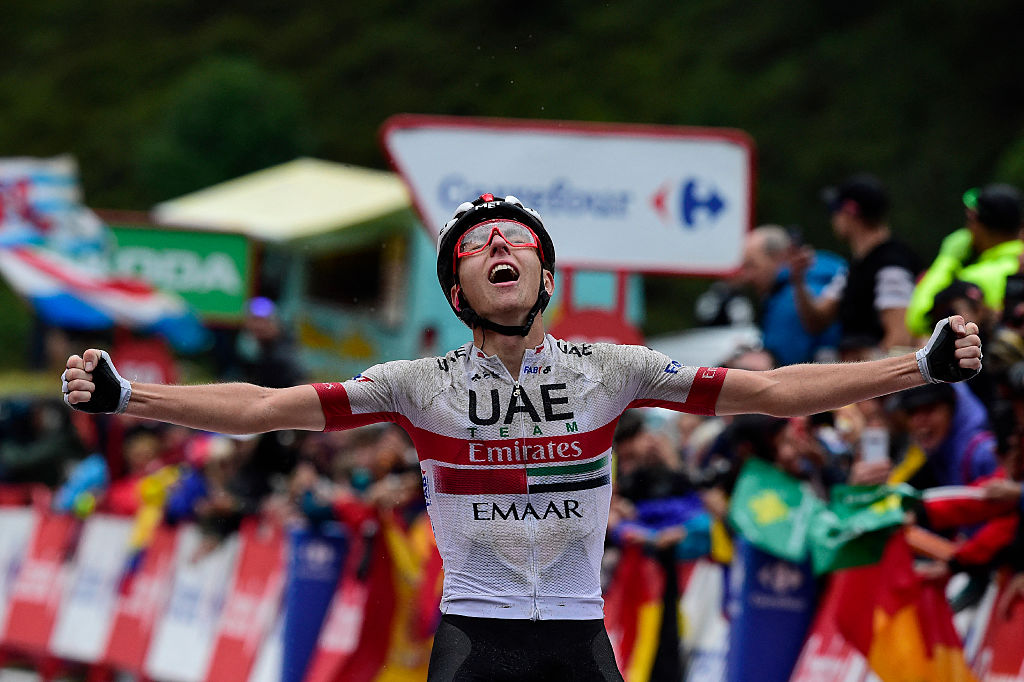
The latest race content, interviews, features, reviews and expert buying guides, direct to your inbox!
You are now subscribed
Your newsletter sign-up was successful
This is part of a mini-series exploring five of the major achievements missing from Tadej Pogačar's already stunning palmarès: Milan-San Remo, Paris-Roubaix, the Vuelta a España, an Olympic title, and a record-equalling fifth Tour de France title.
Can he tick these off? We're taking a closer look at each race to analyse his chances.
A few months back, Alexandre Roos, head of cycling at L'Équipe, could hardly have been more dismissive about Tadej Pogačar's potential future targeting of the Vuelta a España. He wrote that "two obsessions are going to keep him occupied this winter: Milan-San Remo and Paris-Roubaix. These are the two lines that are missing from his palmarès, because frankly, winning a Vuelta would not change anything in Pogačar's career."
Roos' comments on what the Vuelta might mean to Pogačar's ranking in the all-time greats of the sport feel like a majorly misguided underestimation of what winning the one Grand Tour missing from the Slovenian's palmarès really means.
It's not just that victory in the Vuelta would make Pogačar just the eighth male rider in history to clinch the 'set' of three Grand Tours, not to mention the first since Chris Froome in 2018. It's also true that for plenty of fans – though perhaps not those who switch off and head for the beach in August once the Tour is over – taking the Vuelta is in itself a hugely impressive achievement.
It's also perhaps been forgotten in the welter of Pogačar's Tour de France successes that the first time he came close to winning a Grand Tour was actually in the Vuelta a España. It happened, too, with a long-distance attack – the first he ever did in a three-week stage race – in the 2019 edition, when he was the youngest rider in that year's Vuelta and running fifth overall.
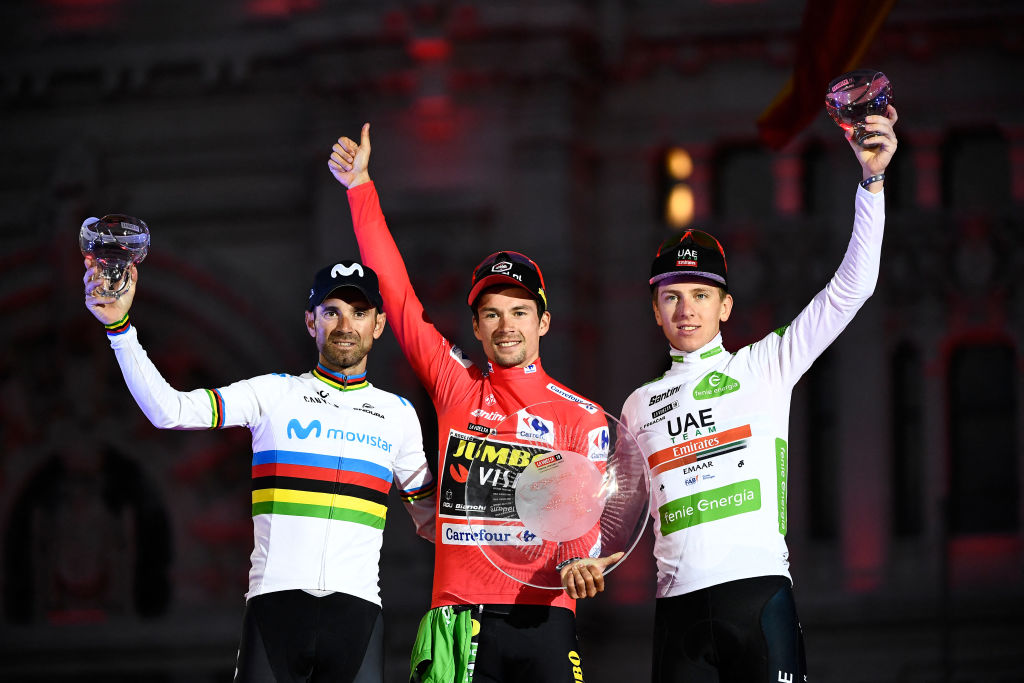
On stage 20 to Sierra de Gredos, five kilometres from the top of the Vuelta's final major climb, the cat. 1 Puerto de Peña Negra, Pogačar launched his move. Searing past Colombian stars of the calibre Nairo Quintana and Miguel Ángel López, the Slovenian quickly built a staggering 1:40 advantage and rising on race leader Primoz Roglič and other GC contenders as he crossed the summit.
The latest race content, interviews, features, reviews and expert buying guides, direct to your inbox!
The older Slovenian was rapidly running out of support riders from his Jumbo-Visma squad, and he was badly isolated. It was only thanks to hard work by Astana and Movistar, keen to defend their podium positions with López and Quintana from Pogačar's assault, that Roglic was able to get back on terms.
However, Pogačar still crossed the line with a 1:33 advantage in what was his third Vuelta stage of that year. It didn't get him overall victory, and he was careful never to state that had been his goal. But with less than 24 hours left to race, Pogačar nonetheless moved into third overall – his first ever Grand Tour podium -–and having only lost time on one mountain stage before despite his young age, the shape of things to come was fast becoming clear, too.
It would have taken another major upset, or some clearer strategic thinking by Movistar and Astana, if they'd opted to let Roglič chase down his compatriot and burn himself out in the process, to see Pogačar make the Vuelta his first Grand Tour overall win. But there can be no doubt, either, that such a stunning final stage win may well boost his sense of unfinished business about Spain's top cycling race. Which begs the question: what could stop him from coming back to the Vuelta sooner rather than later and actually winning it outright?
The World Championships dilemma
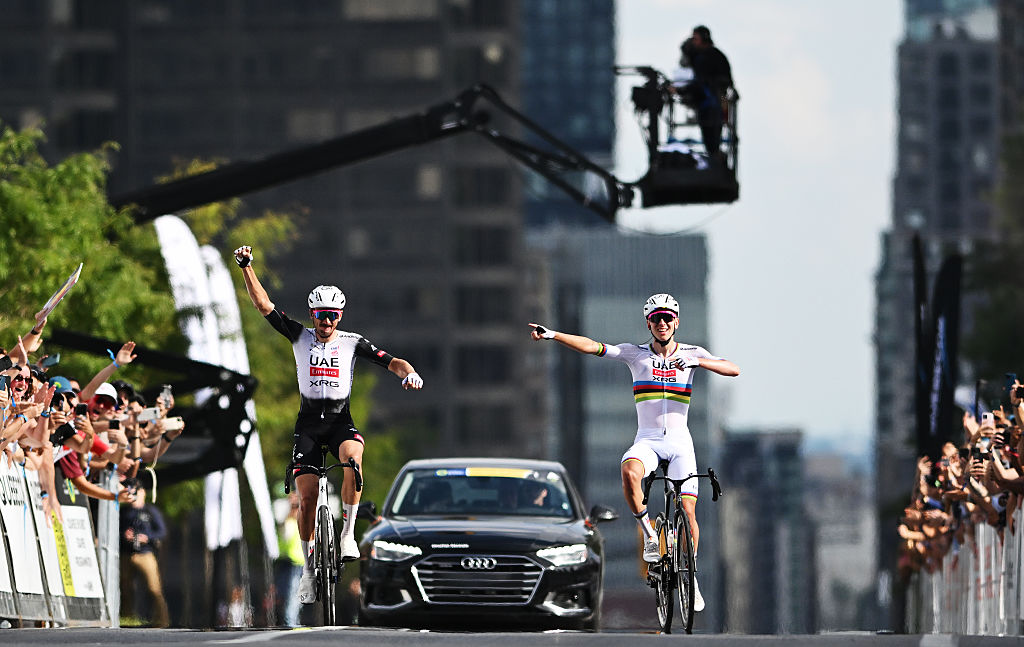
It has to be remembered that – for once – cycling history is not totally on Tadej Pogačar's side when it comes to winning the Vuelta. The last rider other than Pogačar to win at least four Grand Tours was Chris Froome, and it took him a long time to add the Vuelta to his haul.
It's true that Froome was, ultimately, awarded overall victory in the 2011 Vuelta, but that only happened a full eight years after he had stood in second place in Madrid's final podium alongside Juan-Jose Cobo, later stripped of his title for doping. After that 'second' place in 2011, Froome's track record in the Vuelta was fourth in 2012, second in 2014, an abandon in 2015 and second again in 2016. It was only in 2017 that he finally clinched the first of what, following Cobo's doping penalty, would prove to be two victories.
On the other hand, it goes without saying that there is an awful lot more historical evidence that Pogačar should win the Vuelta than the case for him not being able to do so. Of those four riders still ahead of Pogačar in terms of Tour de France victories, only Miguel Indurain never won the Vuelta. The other three five-times Tour winners – Jacques Anquetil, Eddy Merckx and Bernard Hinault – all succeeded at taking at least one. Furthemore, given Pogačar's track record in the Tour de France and Giro d'Italia since he stood on the podium in Madrid in September 2019 alongside Roglič and Alejandro Valverde, regardless of who he faced in a hypothetical Vuelta participation, he'd be the overwhelming favourite bar none.
The first thing stopping Pogačar from winning in the Vuelta is, in fact, himself. His continued interest in conquering the World Championships for at least a third time - already confirmed for next autumn isn't necessarily a full impediment to racing in the Vuelta. But the proximity of the dates of the Vuelta and the Worlds, and a likely preference for a calendar of one-day racing before the definitive fight for another rainbow jersey for Pogačar, do reduce that likelihood.
2026 is probably the most clear-cut case to date of how a 'normal' build-up for the Worlds all but precludes the Vuelta. The location of the Worlds in Montréal in 2026, held just two weeks after the usual brace of Canadian WorldTour races – for which Pogačar has a definite predilection – makes it highly probable he'd head across the Atlantic in early September rather than be grinding round Spain. There's the question of getting over jet lag in good time and the chance to re-familiarise himself with the terrain with another participation in the GP Montréal, a race he's won twice in the last four years and finished second in 2025. All in all, even the most diehard Vuelta fan would admit it's more than logical as the perfect build-up for a crack at the Worlds.
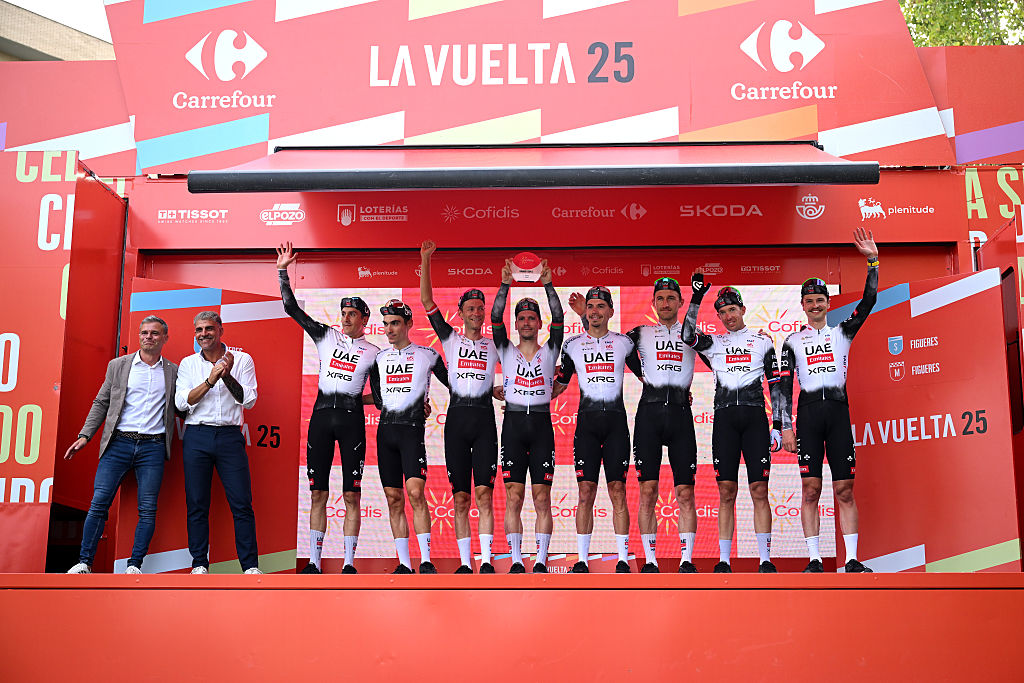
And yet. Pogačar has not revealed his 2026 race program beyond the Tour de France in full, and there are rumours that the 2026 Vuelta start in Monaco, his second residence during the season, has caught his eye. The nine-kilometre opening time trial course on training roads that he knows like the back of his hand would be an unforgettable experience, even for as battle-hardened a racer as the Slovenian star.
On top of that, the 2026 Vuelta is rumoured to have a fairly benign start, with four straightforward stages across France following the Monaco TT prior to a first summit finish showdown – just like in 2025 – on the roads of Andorra. If Pogačar let nostalgia get the better of him, he might well remember that Andorra was where he took his first ever Grand Tour stage win, again in the Vuelta 2019. But a more likely factor to push him to think about taking part in the 2025 Vuelta is that an easy first week would mean he'd avoid risking over-revving his engine a month-and-a-half out from his rainbow jersey target.
When it comes to finding potential challenges, it feels like clutching at straws to say the Vuelta route is arguably the most unpredictable of all three and that Pogačar has a lack of experience compared to many of the rivals in the Vuelta. That's hardly stopped him from taking wins on all sorts of terrain, from the toughest kinds of sterrato in Strade Bianche to the high mountains of the Dolomites to the cobbles of Paris-Roubaix. In fact, knowing how much Pogačar relishes different kinds of race challenges, the prospect of the varied kinds of racing offered by the Vuelta is arguably what would motivate him to take part even more.
Nor can it be said that his team risk having a drop in firepower in the second half of the season, as undoubtedly can happen with some of even the bigger squads. In the 2025 Vuelta – which Pogačar was certainly close to thinking about racing, let's not forget – UAE Team Emirates-XRG scored no fewer than seven stage victories on every kind of terrain barring bunch sprints, and that included the team time trial. Ineos Grenadiers boss Dave Brailsford once famously said he'd prefer to have a strong team leader and a weak squad than the other way round: the chances are very high that in the Vuelta, Pogačar and UAE would be both.

How can Tadej Pogačar win the Vuelta a España?
First and foremost, it goes without saying that as things stand, if Pogačar does take part in the Vuelta, the race will be his to lose even before he's turned a single pedal stroke. The level of superiority he's shown in every other Grand Tour victory to date has been such that even if the Vuelta came at the end of a long season, he'd automatically be the name to beat.
The first step towards that to happen, though, is – as has already been pointed out – for it to be 100% certain that Pogačar is actually going to take part. After all, he initially put the Vuelta on his provisional program for 2025, only for his participation to fall by the wayside, after he'd taken his fourth Tour.
This isn't a criticism: it's actually rare for many of the biggest names to make the Vuelta a definitive target prior to July. Jonas Vingegaard was an exception this year, as was Remco Evenepoel when he won the Vuelta a few years ago. By and large compared with the Tour or Giro, say, the number of those big GC names saying in May or before they are going to go for the Vuelta comprises a very short list.
Should Pogačar decide to try to win the Vuelta, one factor in his favour even before he started would be that it's much more of a race of 'natural attrition' than the Giro or Tour. While the Vuelta attracts a lot of top names each year, generally speaking towards the end of the summer and early and when a race not a top pre-season priority, riders' form is much more liable to be uneven. So even if the potential for there to be a lot of contenders to take on Pogačar at the start line in Monaco, say, the odds are that by the end of the first long week of racing – as happened in this year's Vuelta – the number of riders still in with a chance of winning is quickly whittled down to half a dozen at most.
If Pogačar were present, though, optimism about the odds of beating him amongst his rivals are likely to be low to non-existent. With the one exception of his first-ever Tour de France and last minute victory at La Planche des Belles Filles, Pogačar invariably tries to make a Grand Tour his own as soon as he can – just think back to the Galibier in the 2024 Tour's first week, or Oropa in the Giro d'Italia's stage 2 that same year. Playing a conservative game just doesn't form part of the Pogačar script. Rather he'd most likely try to repeat his strategy of the 2024 Giro and lead it almost from beginning to end.
It's true that in terms of climbs, with the exceptions of two or three monster ascents, the Vuelta doesn't usually tackle nearly such difficult terrain as the Tour or Giro. But that doesn't make the Vuelta the Grand Tour equivalent of Milan-San Remo, where there really isn't the opportunity for Pogačar to break away in his usual style. Far from it: long-distance attacks of the kind he likes can work wonders in the Vuelta, and Pogačar knows it perfectly well himself. After all, that was how he could have won the race back in 2019, with his 40-kilometre solo move on the road to the Sierra de Gredos.
So is it all done and dusted in favour of Pogačar if he rides the Vuelta? No – and not just because of the usual caveats for any Grand Tour contender about illness , crashes or injuries. Rather, it's worth remembering that the one area where UAE have proved vulnerable in the past in stage racing over the years is when it comes to ambushes and unpredictable racing strategies, and in the Vuelta, the odds of the tables being unexpectedly turned are always refreshingly high.
This tendency for the Vuelta to rip up its own script was very evident with Vingegaard on stage 9 this year, when he pounced on a seemingly inoffensive climb to Valdezcaray – and caught UAE completely napping. This wasn't the first time that UAE showed they have some strategic chinks in their armour. It also happened on the road to Le Lioran in last year's Tour de France where Pogačar briefly looked isolated and vulnerable, or even more notably again at the 2025 Giro d'Italia on stage 20, when Simon Yates (Visma-Lease a BIke) pulled off mission impossible to oust UAE's Isaac del Toro from the lead.
The number of occasions when the Vuelta has produced wonderfully unexpected and wide-open scenarios in the past of the kind where UAE might be vulnerable is far greater than in the Tour with its setpiece battles and teams hamstrung by their fear of losing. Just think of Fuente Dè and Alberto Contador's Vuelta-winning long-distance attack in 2012, or Primož Roglič nearly losing the Vuelta when he was ambushed on the road to Guadalajara in 2019. Then one of Chris Froome's Vuelta defeats happened when he was poleaxed by Contador and Quintana in the Pyrenees in 2016, and it's hard to forget Ben O'Connor's surprise attack in 2024 that earned him two weeks in red and second in Madrid.
Nothing can be taken for granted at the Vuelta, then – not even for one of the greatest racers of all-time. But that only makes it far more interesting and intriguing if, or hopefully when, he does take part.
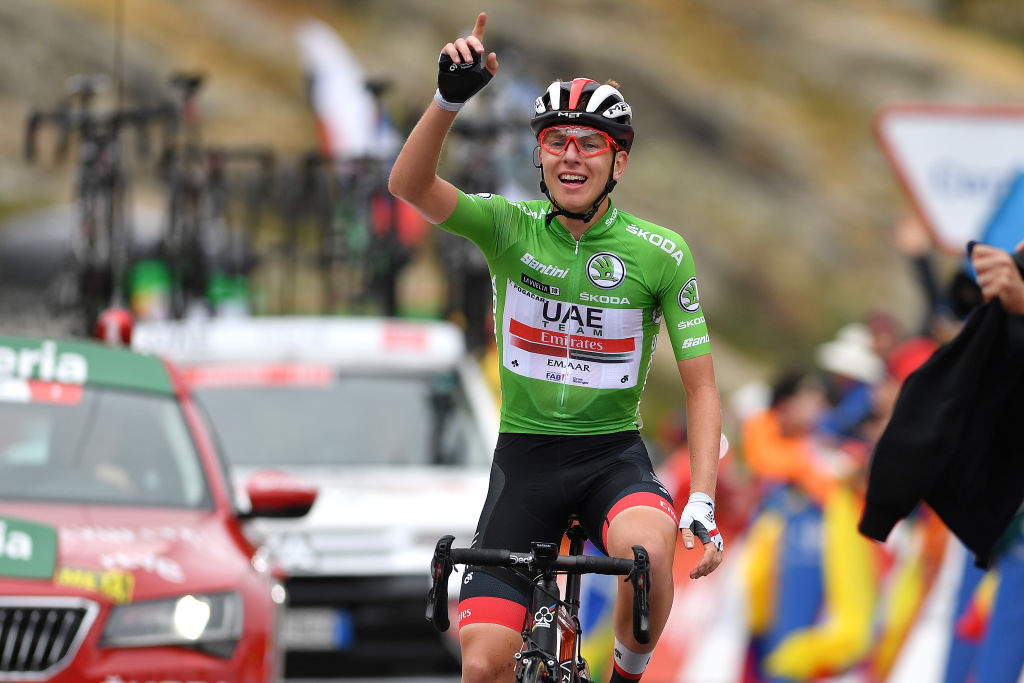
What do you think? Can Pogačar win the Vuelta a España, or could it end up something he's left chasing? Tell us your thoughts in the comments!
Alasdair Fotheringham has been reporting on cycling since 1991. He has covered every Tour de France since 1992 bar one, as well as numerous other bike races of all shapes and sizes, ranging from the Olympic Games in 2008 to the now sadly defunct Subida a Urkiola hill climb in Spain. As well as working for Cyclingnews, he has also written for The Independent, The Guardian, ProCycling, The Express and Reuters.
You must confirm your public display name before commenting
Please logout and then login again, you will then be prompted to enter your display name.

